TRUE TALES FROM THE GLOBAL CRISIS
With Pandemic: Facing AIDS, filmmaker Rory Kennedy tells five personal stories of people living with AIDS, and the resulting documentary is a devastating portrait of a disease ravaging unchecked. Director Barbara Kopple talks with Kennedy.
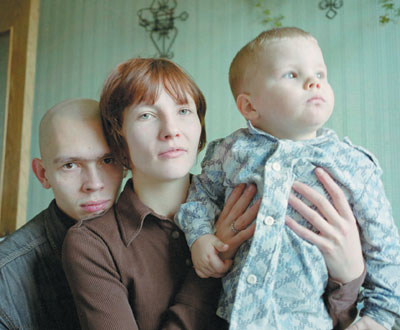 |
| Russian AIDS patients in Rory Kennedy's Pandemic: Facing AIDS. |
Rory Kennedy’s documentary Pandemic: Facing AIDS tells five stories of people living with AIDS in five non-Western countries. A well-crafted and sensitive portrait of individual strength in the face of adversity, the film also finally reveals itself to be an intelligent and accomplished work of political activism. Funded by the Bill & Melinda Gates Foundation and HBO, where it will be broadcast in June, Pandemic crashes through the barriers that customarily prevent world political issues from being seriously discussed in the American media. By focusing on personal stories – and with the power of the cable network behind it – Pandemic forces the viewer to empathize with those suffering this terrible disease within countries lacking quality health care. No one can fail to be moved by the film, and with that emotional response must come indignation at the policies (governmental, economic and from the pharmaceutical companies) that are allowing this crisis to continue.
For Kennedy, Pandemic: Facing AIDS is one of a series of films produced with fellow filmmaker Liz Garbus, who together form the New York production company Moxie Firecracker. Specializing in personal stories that speak to broader political issues, Moxie Firecracker’s productions include such award-winning films as The Farm and American Hollow. Veteran documentarian Barbara Kopple – whose films, notably Harlan County, U.S.A. and American Dream, are themselves models for a new generation of nonfiction filmmakers – spoke with Kennedy.
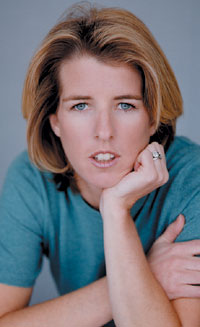 |
| Director Rory Kennedy. |
Rory Kennedy: I got involved in filmmaking during my senior year at college at Brown. I was a women’s studies major, and I had been reading in the paper about cases of pregnant women addicted to drugs and alcohol who were being incarcerated simply because they were addicted at the same time as they were pregnant. A lot of them had actually tried to get treatment, but many programs wouldn’t accept women who were pregnant. And those were not the stories that were coming out in the mainstream press, so I made a film about it called Women of Substance. It was on PBS, and we also did a fairly extensive education outreach campaign with it, and I loved the process. So I came to filmmaking from the perspective of social advocacy more than from a love of film, but I have grown to really love film, and particularly appreciate the history of the documentary form.
Kopple: For you, filmmaking is about making a positive change by showing people’s stories?
Kennedy: Yes. To make a film just to make a film is less important than to make a film that shines light on a particular issue.
Kopple: Would you ever be inclined to make a movie, if somebody calls you up and says, "Hey, you want to do a film about ballet dancers?"
Kennedy: I would, because the search for a story, trying to find what makes somebody tick, is a really interesting process to me. Obviously if it was a film about how great the death penalty is, then I would have an issue with that and I would draw the line.
Kopple: Tell me about your company, about Liz Garbus and about this partnership and how you work so beautifully together.
Kennedy: Liz is my partner at Moxie Firecracker. And she is one of my closest friends. I think we both feel extraordinarily lucky to have found each other and to have been able to create this company together. I would say my relationship with Liz is not unlike a marriage. When you have a partner in a company where you have very creative elements and challenges that people face, it’s kind of the nature of the business, there is constant dialogue, discussion, conversation, trying to work things out. And Liz has just been a perfect partner in those challenges. We have now made about 15 films together in three or four years. We produce all the projects together, and then usually one of us will direct a particular project. Sometimes both of us do. But that enables us room to explore our own artistic and creative directions but have the positive influence and helpful feedback that the other one offers.
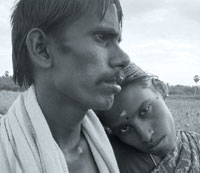 |
| AIDS patients in India. |
Kopple: Why did you decide to do Pandemic, and how did you find your subjects?
Kennedy: One of the first films I made after Women of Substance was called Fire in Our House, which was about needle exchange programs, intravenous drug users and AIDS in the United States. Then a few years ago, I was asked to join a White House delegation that was traveling to Africa to look at the AIDS crisis there. What I saw redefined my understanding of suffering. For example, I met a woman in Uganda who was the mother of 13 children, 12 of whom had died of AIDS, and she was the sole caretaker of 35 grandchildren. As I did more research, I found that what was happening in Africa was starting to happen in other continents around the world. I felt that if other people could see what I was witnessing and experiencing, then they could understand the global AIDS crisis from a different perspective and be inspired to act.
Kopple: Did you have people in different areas helping you to find these characters?
Kennedy: [laughs] One of the challenges of making this film is that we were shooting people who spoke six different languages, none of which were English. We ended up connecting with different "fixers" in each of the countries, and they helped us navigate the countries and identify characters, but they also were the interpreters. When I would be in an emotional situation with characters, I didn’t want my interpreter saying to me, "Okay, she’s crying right now because she’s talking about how she’s going to lose her son." I would want [the person] to keep talking. So I would do a kind of a training session with the fixers, talking to them about my style of filmmaking, that I wanted them to translate every word and every sentence except when it gets emotional, and if they’re making a connection with the characters, I wanted them to keep that going.
Kopple: How did you personally connect with the people?
Kennedy: You are asking people to give so much when you ask them to participate in a film like this. And I think that there’s a certain responsibility to give back, and that takes a lot of energy. We would be able to stay with people for a long period of time and connect with them, and I think ultimately try to give back to them. But it was very hard in this situation, where you knew they were going to die. There’s an inclination to close yourself off and protect yourself from that, but it’s so much more of an enriching experience if you can open yourself up to their pain. Maintaining a sense of compassion and keeping your heart open is important; people feel that.
Kopple: In doing this film, were there any points at which you felt alarmed for your own sense of well-being?
Kennedy: Yes. When you are making a film like this, and people are really sick and dying all around you, and you’re in a far-off place, it can be scary. However rational I was, I couldn’t help but feel some amount of fear for my own self, which was a feeling that made me feel very uncomfortable because I kept reminding myself that this is about other people, not about me [laughs]. The truth is, I’m a bit of a hypochondriac [laughs], so some of these issues would come up. It was scary, but also there are not that many opportunities in life where you can confront your fears.
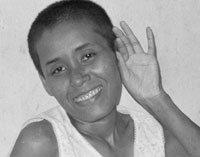 | 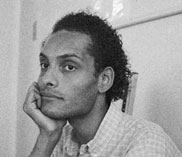 |
| AIDS patients in Thailand (left) and Brazil (right). | |
Kopple: What about in the editing? How did you decide how to formulate this film?
Kennedy: It was a really big challenge to edit this film. We had over 200 hours of footage in six different languages. So we had to get all the material translated, and then we had to digitize it, subtitle a bunch of it, and then review it all, and it was hard, painful footage to watch. But you know, I love editing, and I love being in an edit room. For me it’s easier than being in the field.
Kopple: It’s scarier out in the field.
Kennedy: It’s scarier out in the field, especially in a vérité film where you’re halfway around the world and you don’t know who you are going to film. You arrive in a country and say, I’ve got a week, I’ve got to find a character and a story. And you don’t know, you might miss it. In the editing room, I knew we had the stories, it was just a question of finding them. We basically went through each country and narrowed it down to about an hour, hour-and-a-half, and we ended up with about an eight-hour rough cut. And then we whittled [the footage] down from there until finally we found the film.
Kopple: How long was the editing process?
Kennedy: Six months. The whole production was 14 months from beginning to end.
Kopple: Can you talk a little bit about the young girl who was the sex worker?
Kennedy: That experience was probably the most intense for me in making the documentary. She grew up in a small village in northern Thailand on the Cambodia border. When she was 12 years old she was raped by a number of boys. Because of that she was exiled in her village and community. Her parents had her married when she was 15 years old. She got pregnant with her husband, and as soon as she gave birth, her husband left her. So now she has an infant child, she doesn’t have her family to fall back on, her husband has left her and she has no resources. So she starts working at a bar at the age of 15 to make money. A guy comes in and says, "Will you have sex with me and I will pay you a lot more money?" She agrees and becomes a prostitute. During the course of her prostitution, she contracts HIV and, like so many other people in Thailand, had no place to go. She was lucky enough to get into the hospital, which is where we found her, and she was at the end stages of AIDS. While we were there with her for a few days, she had come to grips with the fact that she was going to die and wasn’t going to see her family anymore. Two days later she woke up and said, "I couldn’t sleep last night. I decided I have to say goodbye to my son. I have to say goodbye to my parents." So we made arrangements with her to make a nine-hour drive. We show up there at about 11:00 on a very rainy night after a long drive, and Lek walks up to her house and starts banging on the door. The door opens, and when her mom sees her, Lek bursts out crying and her mother catches her in her arms. She now weighs 90 pounds and her bones are showing, her hair is gone, and her mother is touching every little centimeter of her body, just looking through her hair, her arms, her legs, and asking her, "Why, why do you look like this?" And Lek says, "Mom, you know, I’m going to die. I’ve come to say goodbye." And then her father says to her: "Get out of my house! Nobody will ever speak to us again because you have AIDS. Get out!" And he sends her off.
Kopple: But he also said, "I’m sorry I can’t help you." As a strong, macho man in that culture, he must have felt so powerless that he wasn’t able to help his daughter.
Kennedy: Absolutely. I think that that scene more than any other speaks to the stigma of AIDS and how the stigma is more upsetting and difficult to deal with than the physical reality. And AIDS is, physically, a horrifying death. For me, Lek is the hero in that story because she had the strength to face what she most feared: rejection. But her father and mother are also heroes – two weeks later they go and pick her up at the hospital, take her home and fully embrace her. That is testimony to how much we can do, because when you educate people about AIDS, you can break through that [stigma] and it deflates instantly.
Kopple: Is that also a reason why you make films – to tell stories and to allow people inside of other’s souls?
Kennedy: Absolutely. That’s the power of documentary. And that’s why in a film like Pandemic, we don’t sit there with experts telling you what to think about AIDS, or throw statistic after statistic at you. We give a framework of where the AIDS crisis is in any given place, but then we focus on one story in each country. When people leave, they forget the numbers, but what they’ll remember for years later is the person.
Kopple: Did this particular film change you at all as a person or give you more strength and more energy to say, "I’m going to continue to do the things I care about?"
Kennedy: Well, quite honestly, it was exhausting to make this film. You can’t be confronted with the people and the situations that I saw without being sapped a little bit from that. But at the same time, there are so many extraordinary moments that were really invigorating and life-affirming. I’m so happy it’s going to be on HBO because it’ll reach a very wide audience. Our hope is that people will see this project and be inspired to do something. There have been few times in history where you have a situation like the global AIDS crisis, where if we don’t do anything, we know 50 million more are going to die in the next 10 years, or contract AIDS. And if we do something, we can prevent that. It’s not an option to sit on the sidelines.
VOD CALENDAR


 See the VOD Calendar →
See the VOD Calendar →


